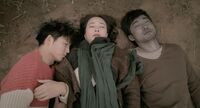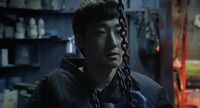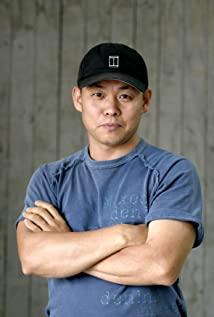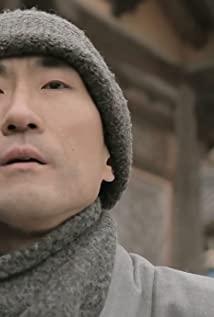The factory in Cheonggyecheon is the part abandoned by the developing city. The ruthless debt collectors, the servile debtors, their incomplete souls and spirits are all products of the operation of the icy city. They rise because of money and fall because of money.
The most powerful thing about Kim is to face the problem of human nature: using money to challenge human nature. Saying such words from the mouth of a person who has nothing, is oppressed by society, persecuted by others, and even handicapped is irony, truth, and shock. We have seen a lot of the rich and powerful chasing after money interests, and we have seen how the backs of the powerless are bent by money. In my consistent thinking, the collusion between the powerful and the money is evil, ugly, and evidence of the annihilation of human nature; the pursuit of money by people at the bottom of society is a last resort, pitiful, and anger towards society. But letting people at the bottom of society say such a sentence, the contrast produced is also a warning that all people are equal in front of money. The jealousy, vengeance, viciousness he instills in everyone is the same.
At the same time, another antagonistic contrast presented in the film focuses on debt collectors and debtors.
The suffering of debtors is obvious to all. All they have is a pair of hands stroking the machine. Their wish for the rest of their lives may be to survive in the factory. We should probably have considerable sympathy. But the emotional pain is in the conflict and aggression of the emotions. When they face violence, they beg for mercy, and when they are crippled, they vibrate and cry, and when they are dominated by anger and vengeance, they rise up and resist and speak against each other. This is a living human nature, a broken soul.
Before being maimed, they chose usury themselves, and some of the consequences of their own choices have to be borne by themselves. Not everything should be attributed to unfairness, and some things are their own actions. The sad thing is that they are about to die and still care about their mother.
There are a total of 5 pairs of families where the male protagonist begins to collect debts. Except for the first pair, it is obvious that the family relationship is son-mother, or father-child. Their relationship is generally dependent on each other, so in contrast to the male protagonist's state, a person who has grown up with a serious lack of maternal love has become indifferent, cruel, and violent. The extreme ruthlessness is due to his extreme lack in some aspect, and he has an extreme desire for extreme lack in the subconscious.
The best way to get revenge on a person is to be disillusioned with extreme desire for feelings. So the Virgin appeared. The birth of a child into the body of the Virgin is a provocation to the forbidden authority, and it is also the doubt and fear of the Son of himself. 30 years of lack of emotion, how to balance sudden emotions, no one has taught him how to identify maternal love. 30 years of loneliness and numbness, and emotional conflict with Oedipus gave him a sense of new life, but also struggled with a cruel gaze on the past.
So he has the cowardice and servility that ordinary people should have. His mother became his weakness. He entered the trap that the Virgin had laid for him. So the positions of the perpetrator and the abused are reversed.
Jiang Dao begged bitterly in the face of the empty building, and what he asked for forgiveness was actually a Virgin's revenge.
On the one hand, Mi Sun seeks revenge for her son, but on the other hand, she also knows that Jiang Dao is a pitiful person. But the mission of revenge still made her choose to destroy Jiang Dao.
The final scene has a strange beauty. The three of them lay in the dusty grave together. Jiang Dao was wearing the clothes that Meishan woven for his son, like a baby snuggling by Meishan's side. In fact, his fantasy was not shattered, but he was redeemed. ceremony. So, Jiang Dao hung his own under the truck with a hook and slashed the road with blood. This was a way home, leading to the other side.
In fact, another aspect that I think about is the relationship between the victim and the perpetrator. The victim and the perpetrator seem to have always been in their own frameworks, pitiful - brutal. And the attitude of the public is often, sympathy - hatred. However, it is always unfair to make remarks without seeing all the stories, and the harm of emotional violence is often fatal. But, in a society where information is cluttered and the public is short of attention and time, who will take the initiative to learn about their stories?
View more about Pieta reviews










